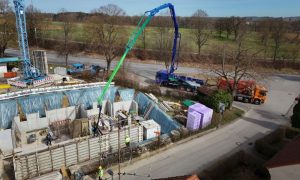Smart cities will require forward-focused data management
More integration and data-sharing is likely to occur as confidence grows in smart cities, and as governments’ digital transformation programs reach maturity says Fred Crehan, Area Vice President, Emerging Markets at Confluent

Ambition has become the defining trait of GCC countries. In a world fraught with environmental and resource challenges, governments here have turned to the concept of smart cities as a template for society-first infrastructure. The Line, part of Saudi Arabia’s US $500bn Neom project, is touted by its developers as the “future of urban living” and is being built to accommodate nine million people. A mere 200m wide, it will stretch across 170km of Saudi Arabian desert and soar to half a kilometre above it. A paragon of sustainability, it will run on 100% sustainable energy sources and be free of cars and, by implication, emissions. Instead, residents will walk to facilities, each of which will be no farther than five minutes from their homes.
The Line is just one region in Neom, and Neom is not the Kingdom’s only smart city venture. The Red Sea Project focuses on sustainable (or regenerative) tourism. And Saudi Arabia is not the only Arab Gulf country planning smart cities. Mubadala Development’s Masdar City in Abu Dhabi is one example. Kuwait’s South Saad Al Abdullah is another.
None of these projects would be possible without recent breakthroughs in technology. Innovations in areas such as artificial intelligence (AI) and the Internet of Things (IoT) have given innovators confidence to think big, bigger, and biggest. Smart cities are visualised as seas of sensors, cameras, and other hardware that form a detailed, accurate, real-time view of the urban environment for governments, businesses, and citizens. At the centre lies the cloud, home to and provider of all these technologies.
Accessibility, scalability, and security
Everything from our energy and utilities to our roads and emergency services can be improved. But to work as intended, smart cities will require careful thought on the management of data, which needs to be scalable, secure, and instantly accessible at all times through a variety of channels. GCC governments have already embarked on a dizzying array of digital transformation schemes to leverage emerging technologies. These projects involve a mix of refreshes of old data architectures, the integration of others, and the cleaning and transformation of data to support real-time processing for up-to-the-minute actionable intelligence.

All of this must be backed up by minimal latency and zero downtime, even (in fact, especially) during a disaster. Rivers of data flow constantly into a central lake, but lakes must be duplicated for resilience. Meanwhile, smart-edge processing frameworks take care of data reduction to ensure signals can be separated from white noise, moment to moment.
This system allows authorities at the municipal and national levels to make quicker and more effective decisions. When it comes to emergency response, traffic-congestion and road-closure data allows decision-makers to plan the most effective route for first responders to safely get to an incident. The same information can be shared with citizens to help them commute more conveniently.
Planning for the worst
Downtime exposes the smart city society to a catalogue of inconveniences and dangers, some of them physical. Outages can also be the prelude to sophisticated cyberattacks. Good data management and robust cybersecurity go hand in hand. Any threat posture for a smart city should include comprehensive playbooks on mitigation and disaster recovery. And when looking for protection, decision-makers should look to scalable cloud services that can offer always-on protections against internal and external threats.
The growth in worldwide urbanisation has led to an increase in the demand for public services and utilities, and hence a surge in data volumes. Good data management must account for daily, weekly, monthly, and seasonal peaks in user activity. Again, such capacity issues are best addressed through the elasticity of cloud services, which also tend to be cost-effective, and easy to deploy and use.

The cloud is likely to form the foundation of every smart city ever built. Underlying technologies are managed by a trusted partner, which allows innovators to focus on adding value for the communities they serve rather than having to devote resources to maintenance or resourcing. More experiences, services, and platforms will be added as new technologies emerge.
Innovation, not upkeep
More integration and data-sharing is likely to occur as confidence grows in smart cities, and as governments’ digital transformation programs reach maturity. The ability to handle multiple database formats, across the cloud and traditional sources will be critical, as will the ability to opt for hybrid and multi-cloud environments to solve problems. Data streaming models facilitate these flexibilities because they draw from multiple sources and integrate information into actionable dashboards, rather than serving up segmented snapshots.
Confluent’s 2022 State of Data in Motion report showed 97% of the world’s organisations have used real-time data streaming and 80% consider it critical in building responsive business processes. With projects like Neom and Masdar in the pipeline, we are going to be seeing a marked increase in real-time data management capabilities, given the benefits they can bring to performance and maintenance. Governments should always be focused on their vision rather than having to trouble themselves with the trivia of data integrity and infrastructure upkeep.
We can imagine the results springing up across the region. Shimmering, safe, efficient, clean-energy environments stretching out to the horizon. Ever-watchful administrators keeping everything in check through the power of streaming data, and ready to react swiftly and precisely to any internal or external disruption. At the heart of this new urban paradise? The cloud – a scalable home for all the data and technologies that allow governments to automate these great societies and keep enhancing them to make life better for all citizens.
Read more:
- Over $1.1tn in real estate and infrastructure projects currently underway in Saudi Arabia
- Saudi Crown Prince unveils designs of The Line, revealing future city will be just 200m wide
- How digitisation is helping cities provide clean water
- How innovating in sustainability and smart cities can pull us back from the brink














